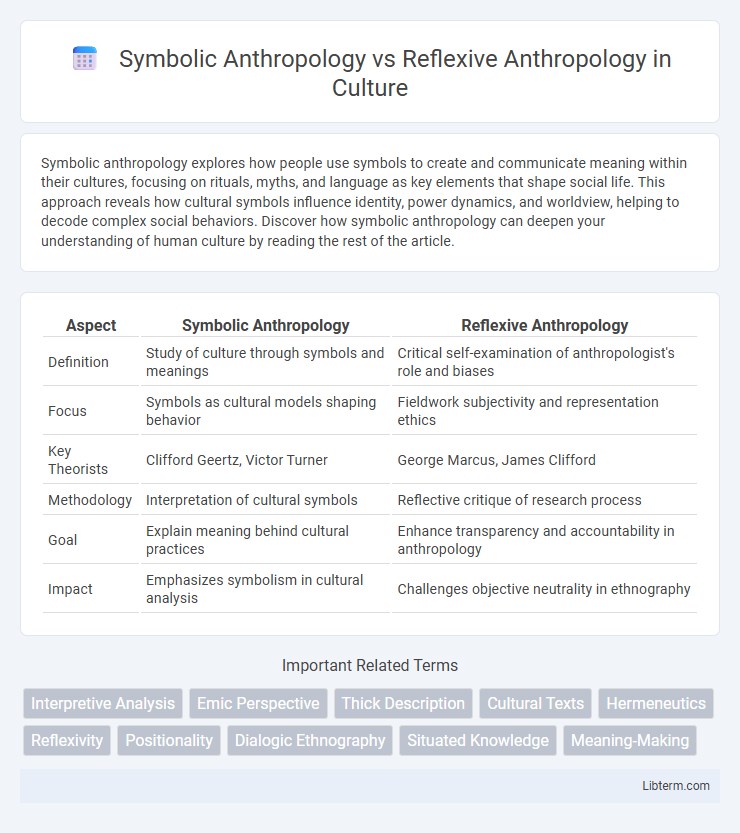Symbolic anthropology explores how people use symbols to create and communicate meaning within their cultures, focusing on rituals, myths, and language as key elements that shape social life. This approach reveals how cultural symbols influence identity, power dynamics, and worldview, helping to decode complex social behaviors. Discover how symbolic anthropology can deepen your understanding of human culture by reading the rest of the article.
Table of Comparison
| Aspect | Symbolic Anthropology | Reflexive Anthropology |
|---|---|---|
| Definition | Study of culture through symbols and meanings | Critical self-examination of anthropologist's role and biases |
| Focus | Symbols as cultural models shaping behavior | Fieldwork subjectivity and representation ethics |
| Key Theorists | Clifford Geertz, Victor Turner | George Marcus, James Clifford |
| Methodology | Interpretation of cultural symbols | Reflective critique of research process |
| Goal | Explain meaning behind cultural practices | Enhance transparency and accountability in anthropology |
| Impact | Emphasizes symbolism in cultural analysis | Challenges objective neutrality in ethnography |
Introduction to Symbolic and Reflexive Anthropology
Symbolic Anthropology examines culture through the interpretation of symbols and meanings embedded in social practices, emphasizing how individuals and groups create and communicate shared understandings. Reflexive Anthropology critiques the observer's influence on ethnographic research, highlighting the importance of self-awareness and the impact of the anthropologist's presence on knowledge production. Both approaches contribute to cultural analysis by addressing symbolic representation and the reflexivity inherent in ethnographic methodology.
Historical Development of Symbolic Anthropology
Symbolic Anthropology emerged in the 1960s with key figures like Clifford Geertz emphasizing the interpretation of cultural symbols to understand societies. Its historical development marked a shift from structural-functionalism towards exploring meaning-making processes within cultural contexts. Reflexive Anthropology later evolved as a critical response, focusing on the researcher's influence and promoting self-awareness in ethnographic analysis.
Key Theorists in Symbolic Anthropology
Key theorists in Symbolic Anthropology include Clifford Geertz, who emphasized interpreting cultures through thick description of symbols, and Victor Turner, known for exploring rituals and symbols as dynamic social processes. Symbolic Anthropology focuses on understanding cultural meanings embedded in symbols and practices, contrasting with Reflexive Anthropology's emphasis on the anthropologist's self-critique and positionality. These contributions have shaped approaches to analyzing cultural symbols within social contexts.
Central Concepts in Symbolic Anthropology
Symbolic Anthropology centers on the interpretation of cultural symbols and rituals as key to understanding social meanings and values, emphasizing culture as a system of symbols that guide behavior. Core concepts include thick description, introduced by Clifford Geertz, which involves detailed interpretation of symbolic acts within their cultural context, and the idea that symbols function as vehicles for expressing and reinforcing collective beliefs. Reflexive Anthropology critiques and expands on this by highlighting the anthropologist's role in constructing knowledge, advocating for self-awareness regarding the researcher's influence on representing cultures.
Emergence of Reflexive Anthropology
The emergence of Reflexive Anthropology marked a critical shift from Symbolic Anthropology's focus on interpreting cultural symbols to emphasizing anthropologists' self-awareness and positionality in research. Reflexive Anthropology highlights how the observer's identity, biases, and interactions influence ethnographic knowledge production. This approach fosters transparency and critical examination of power dynamics, reshaping anthropological methodologies and epistemologies.
Main Proponents of Reflexive Anthropology
Clifford Geertz is a principal proponent of Reflexive Anthropology, emphasizing interpretive methods and the importance of understanding culture through thick description. His work critiques Symbolic Anthropology's focus on symbols by urging anthropologists to consider their own role in shaping ethnographic narratives. George Marcus further advanced Reflexive Anthropology by promoting collaborative ethnography and critical self-awareness in anthropological writing.
Core Principles of Reflexive Anthropology
Reflexive Anthropology centers on the core principle that anthropologists must critically examine their own role, biases, and influence within the research process, emphasizing self-awareness and ethical responsibility. It challenges the traditional objective stance by advocating for transparency in how cultural interpretations are shaped through the anthropologist's perspective. This approach contrasts with Symbolic Anthropology, which primarily analyzes cultural symbols and meanings without necessarily addressing the anthropologist's subjective impact.
Methodological Differences between Symbolic and Reflexive Anthropology
Symbolic anthropology emphasizes interpreting cultural symbols and meanings through qualitative methods such as ethnographic observation and participant interpretation, focusing on understanding shared symbols within a culture. Reflexive anthropology employs a critical approach that incorporates the anthropologist's self-awareness and positionality in the research process, using methodological tools like reflexive journals and collaborative ethnography to analyze power dynamics and researchers' influence on data. Symbolic anthropology seeks to decode cultural meanings, while reflexive anthropology critically examines knowledge production and the intersubjective relationship between researcher and subjects.
Strengths and Critiques of Both Approaches
Symbolic anthropology excels in decoding cultural symbols and rituals to reveal underlying societal meanings, enhancing understanding of collective human behaviors, yet it faces critiques for overemphasizing symbolism at the expense of material conditions. Reflexive anthropology strengthens ethnographic work by emphasizing the researcher's influence on the data and addressing power dynamics, promoting ethical transparency and self-awareness, but it can be critiqued for excessive subjectivity that may undermine objective analysis. Both approaches contribute valuable insights: symbolic anthropology highlights cultural meanings while reflexive anthropology ensures methodological rigor and ethical accountability in anthropological research.
Contemporary Relevance and Future Directions
Symbolic Anthropology emphasizes understanding culture through symbols and meanings, offering critical insights into rituals and societal values that remain vital for interpreting global cultural dynamics today. Reflexive Anthropology challenges researchers to acknowledge their influence on ethnographic work, promoting ethical practices and deeper self-awareness essential in contemporary cross-cultural studies. Future directions include integrating digital technologies and interdisciplinary approaches to enhance cultural analysis and expand the impact of both perspectives in addressing complex social issues.
Symbolic Anthropology Infographic

 libterm.com
libterm.com